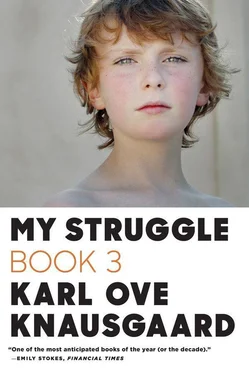One evening I was hanging out with Sverre, who also liked role plays and was also a good student and bore a strong enough resemblance to me for two substitue teachers to think, independently of each other, that we were twins, and I suggested going to visit Fru Høst. She lived three kilometers or so east of the estate.
“Good idea,” Sverre said. “But my bike’s got a flat. And it’s a bit of a hike on foot.”
“Let’s hitch,” I said.
“OK.”
We walked down to the crossroads and stood by the curb. I had hitchhiked quite a lot the previous year, mostly with Dag Magne, to Hove or up to Roligheden or some of the other places we found appealing, and we had never stood there for more than an hour without getting a lift.
This evening the first car stopped.
There were two guys inside.
We got in. They were playing loud music; the windows were vibrating from the bass. The driver turned to us.
“And where are you going?”
We told him, he put the car in gear, and drove off so fast we were pinned back against the seat.
“Who lives out there?”
“Fru Høst,” Sverre said. “She’s our teacher at school.”
“Aha!” the one in the passenger seat said. “You’re going there to cause some mischief. We did that, too, when we were younger. Went to the teachers’ places and tormented the hell out of them.”
“Well, we’re not going to do that exactly,” I said. “We’re just going to visit her.”
He turned and looked at me.
“Visit her? Why? Something to do with homework or what?”
“No-o,” I said. “We just felt like it.”
He turned back. They were silent for the rest of the journey. Braked sharply at the crossroads.
“Looks like the end of the road,” the driver said.
I had a bit of a bad conscience, knowing we had disappointed them, but lying wasn’t an option. So I thanked them as warmly as I could.
They raced off into the darkness with the bass pounding.
Sverre and I trudged up the gravel driveway. Large leafy trees with outstretched branches on both sides. We had never been to her house, but we knew where it was.
There were two cars outside and all the windows were lit.
I rang the bell.
“My goodness,” Fru Høst said in surprise, opening the door.
“We thought we would visit you,” I said.
“Can we come in?” Sverre said.
She hesitated.
“I’m afraid I have visitors here. It’s not such a convenient time. But did you come all this way just to visit me?”
“Yes.”
“Come on in then! You can stay for half an hour if you like. In fact, I have some cookies. And some juice!”
We went in.
The living room was full of adults. Fru Høst introduced us, we sat down at the table, on stools, and she gave us a plate with three cookies on it and a glass of juice.
She said we were her favorite students and we were such good actors.
“Could they perform something for us now?” someone asked.
Fru Høst glanced at us.
“Could do,” I said. “OK with you?”
“Of course,” Sverre said.
I tucked my hair behind my ears, pouted, and we were off, improvising, and it made everyone there laugh. After the performance we bowed, slightly flushed but happy to hear the applause.
I repeated the success at the fancy dress party just before Christmas when both Dag Magne and I dressed up as women, complete with makeup, dress, and handbag, and my impersonation was so good that no one recognized me, not even Dag Lothar, who I was standing next to for at least five minutes before he suddenly realized who the stranger really was.
Although I wasn’t ashamed about dressing up as a girl, nor about discussing girlish things with them, I also actually went out with some of them. The best was Mariann, it lasted two weeks, we went skating together, she sat on my lap and kissed me, I went to her birthday party, the only boy, and she sat on my lap and I held her while she chatted to her friends, we made out there, too, but after a while I grew tired of it — she was without doubt one of the best-looking girls at school, although not at the absolute top — and perhaps I also felt a little sorry for her because she lived alone with her mother and sister and they were quite poor, for example, she almost never had any new clothes, her mother did the best she could with old ones and hand-me-downs, so I felt an emptiness when I was in her room and claustrophobia when we kissed, I just wanted to leave as soon as possible, and finally I persuaded Dag Magne to tell her it was over. That same day I made a terrible mistake, she was running behind me in the wet weather shelter, and as a purely reflex action I stuck my foot out, she tripped, and hit her face on the tarmac, there was blood and she cried, but that wasn’t the worst, the worst was the ensuing fury she poured over me, which the other girls united behind as they gathered round to help her. It would be wrong to say that I was popular for the next few weeks. That I hadn’t meant anything by it, that I had only done it for fun, didn’t get much of a sympathetic response. At times it was as though the girls really hated me, considered me some sort of scum; at others it was the opposite, not only did they want to talk to me but at the class parties we had begun to arrange, in one another’s houses and at school, they also wanted to dance with me. My attitude to them was also ambivalent, at least as far as the girls in my class were concerned. On the one hand, I knew them so well that after close to five years at school I was completely indifferent toward them; on the other hand, they had started changing, the bulges under their sweaters were growing, their hips were widening, and they were behaving differently, they had risen above us, suddenly when they looked at boys, they were from two or three classes up. With our high-pitched voices, more or less furtive glances, as we admired all the attributes they now possessed, we were no more than air to them. But even though they were so important, they knew nothing about the world they were moving toward. What did they know about men and women and desire? Had they read Wilbur Smith, where women were taken by force under stormy skies? Had they read Ken Follett, where a man shaves a woman’s pussy while she lies in a foam-filled bathtub with her eyes closed? Had they read Insect Summer by Knut Faldbakken, the passage that I knew by heart, when he takes her panties off in the hay? Had they ever gotten their hands on a porn magazine? And what did they know about music? They liked what everyone liked, The Kids and all the other crap on the hit lists, it meant nothing to them, not really, they had no idea what music was or what it could be. They could barely dress, they turned up at school wearing the strangest combinations of clothes and didn’t realize. And they were looking down on me? I had read Wilbur Smith and Ken Follett and Knut Faldbakken, I had been flicking through porn mags for years, I listened to bands who really counted, and I knew how to dress. And was I supposed to be inferior to them?
To demonstrate the true state of affairs, I pulled off a little coup in the music lesson. Every Friday we had something we called “Class Top of the Pops.” Six of us would bring along a song that everyone voted on afterward. Mine always came last, whatever I played. Led Zeppelin, Queen, Wings, The Beatles, The Police, The Jam, Skids — the result was the same, one or two votes, last. I knew they were voting against me and not the music. They weren’t really listening to the music. This irritated me beyond endurance. I complained to Yngve and he not only understood how irritating it was, because he disliked hit list music, too, but he also came up with a way to trick them. The Kids’ second record hadn’t been released yet. One Friday I took with me The Aller Værste!’s first LP, Materialtretthet, which Yngve had bought a few days before, and said that I had an advance copy of The Kids’ new record. The music teacher was in on my ruse and played the first song off the LP, which was still in a white inside sleeve because, as I told them, the record was so new that the cover hadn’t been designed yet. For them The Aller Værste! was the worst of the lot, the last time I had played a song by them, the single “Rene Hender,” they had shouted, Rene Hender! Rene Hender! after me for several days, but when the first notes of the band’s first song sounded in the classroom it was to mumbles of appreciation and mounting enthusiasm, which culminated when the vote was taken and it transpired that The Aller Værste! under the pseudonym of The Kids, had won hands down. How the triumph shone in my eyes as I was able to stand up and say that they had not voted for The Kids but for The Aller Værste! I said this proved that they weren’t interested in the music, there were other issues determining their votes. How angry they were! But there was nothing they could say. I had fooled them too well for that.
Читать дальше












